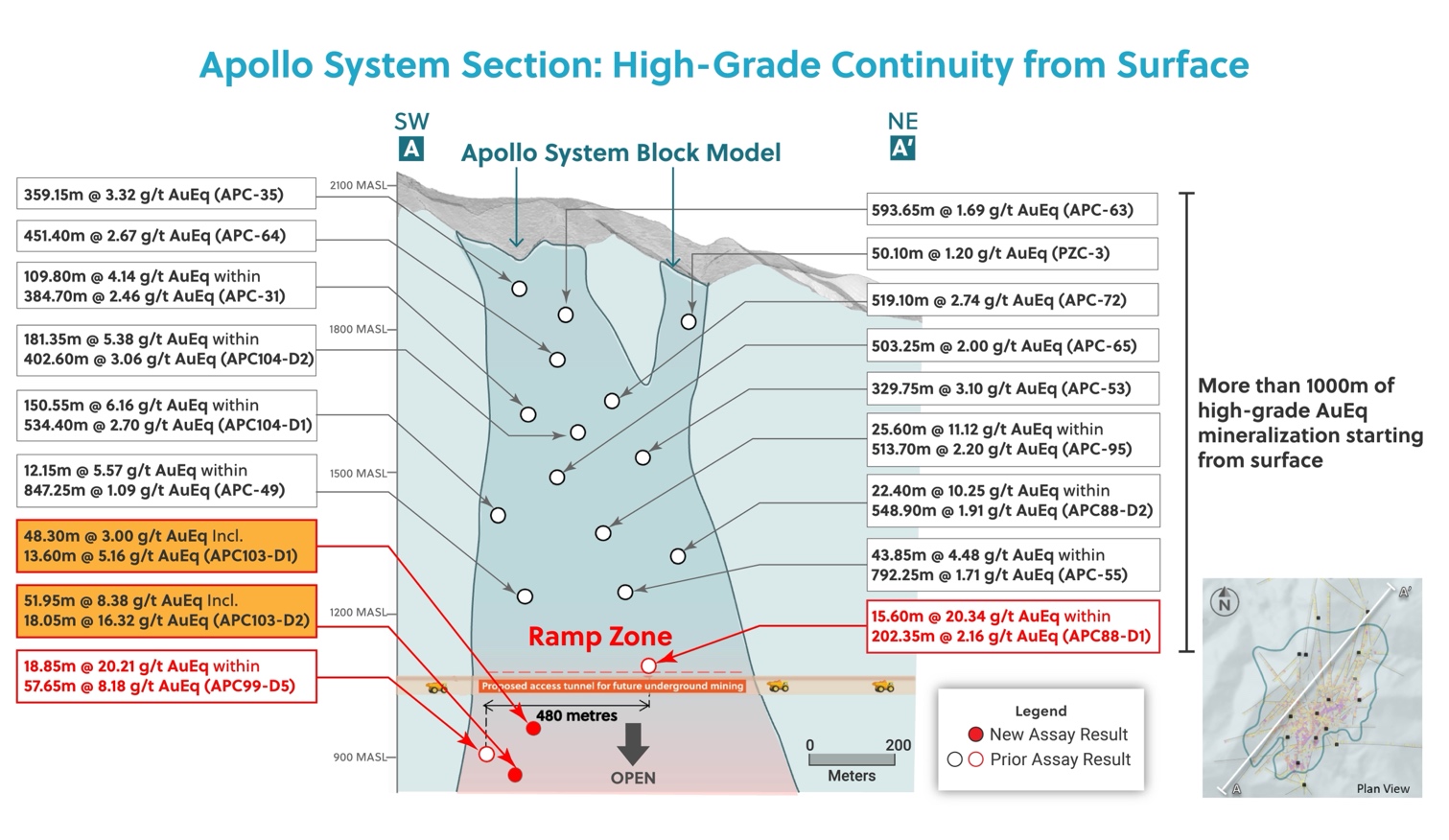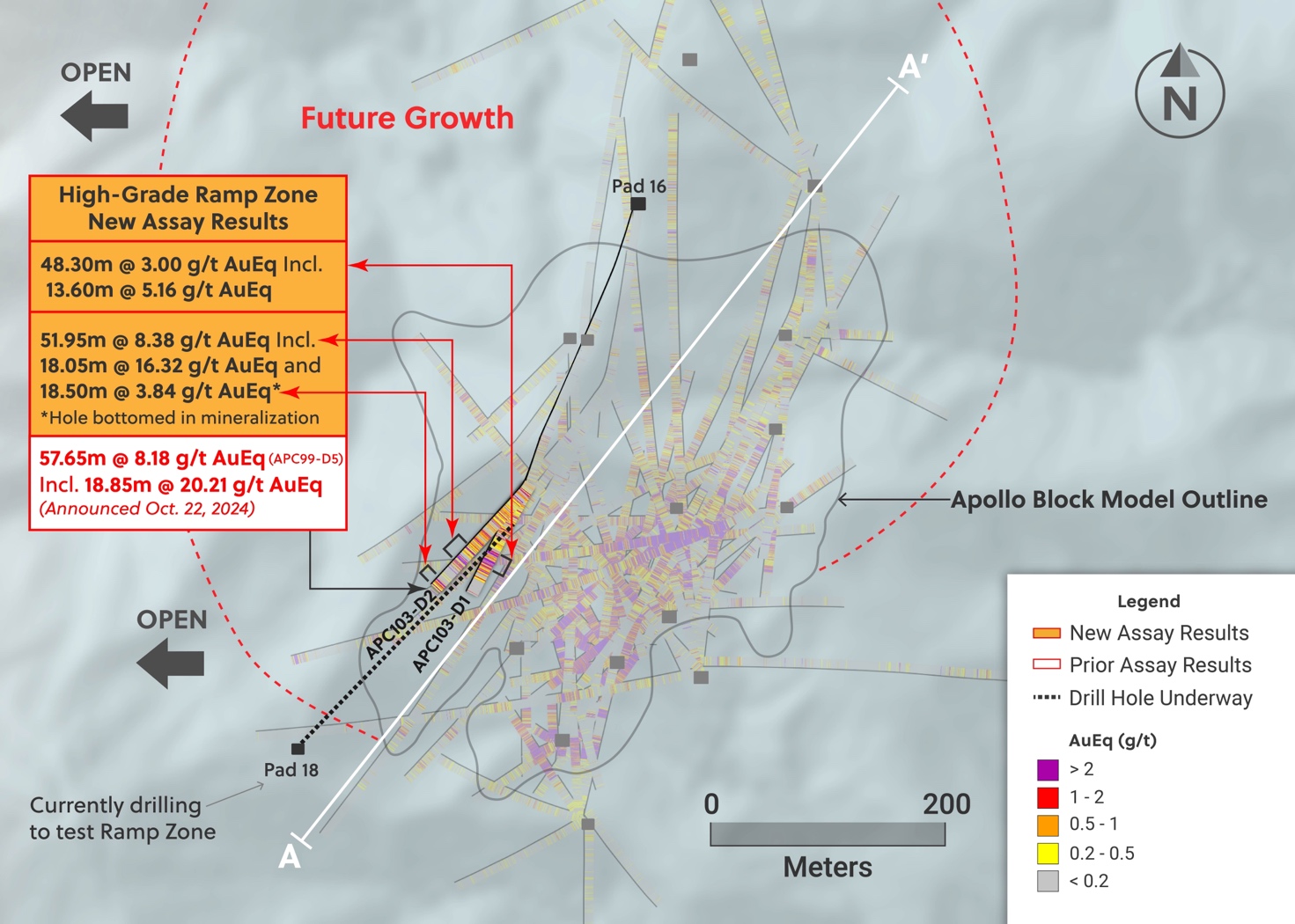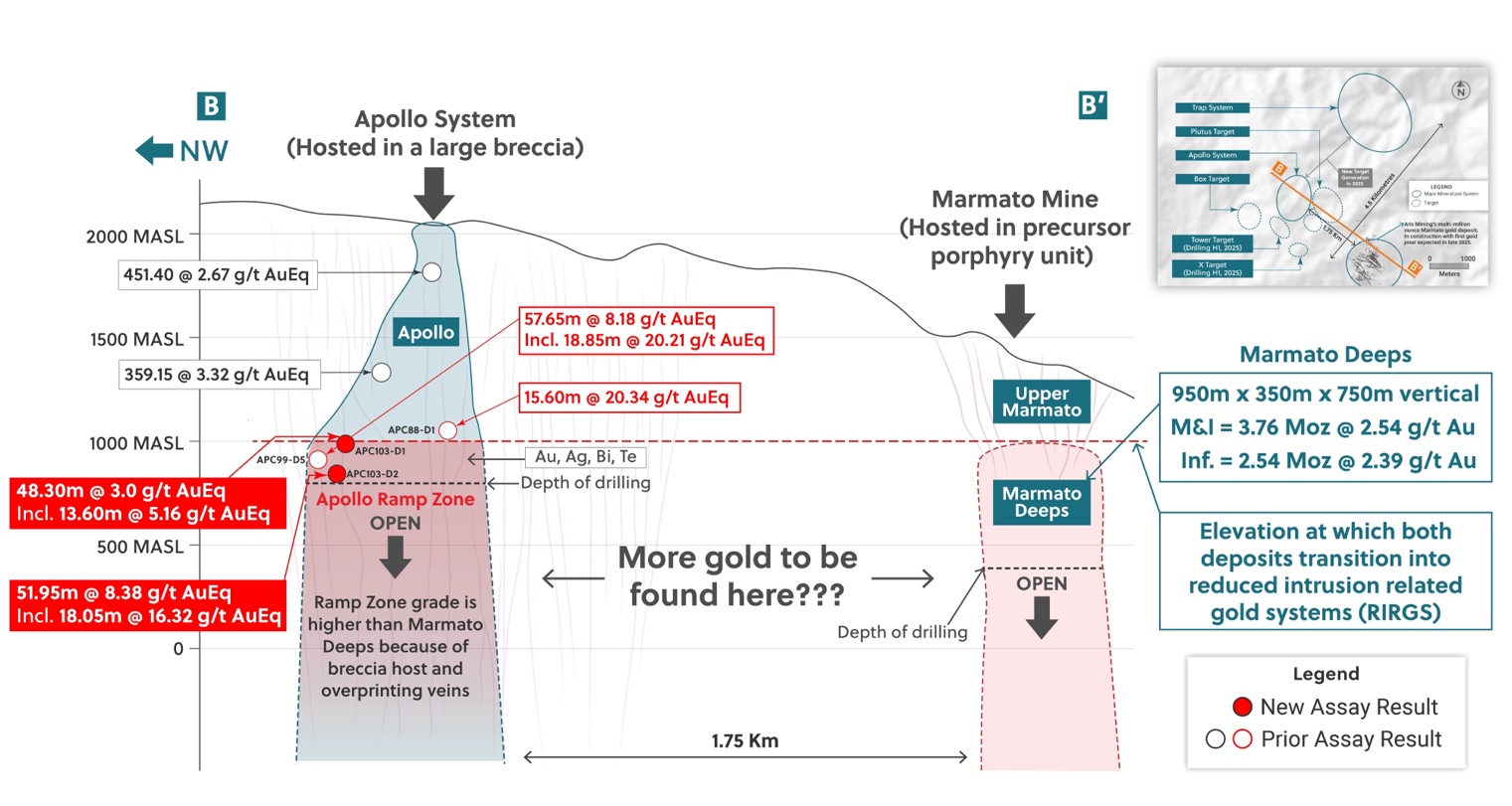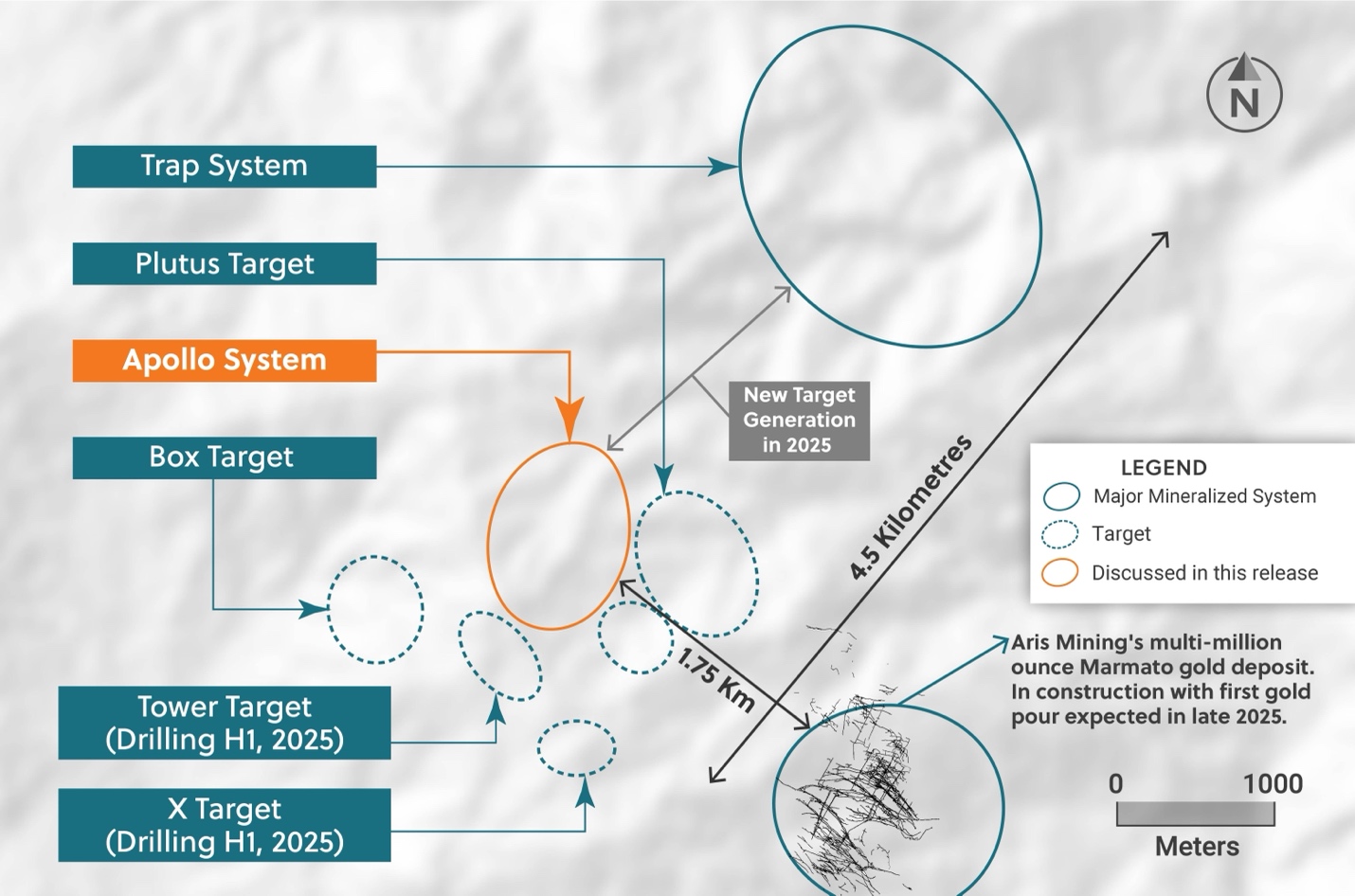- Drill Hole APC103-D2 cut an impressive 51.95 metres grading 8.38 g/t gold equivalent in the New Ramp Zone discovery and is the deepest hole ever drilled at the Apollo system with the hole bottoming in mineralization at approximately 1,200 metres below surface. Both holes announced herein have expanded the recently discovered high-grade Ramp Zone by approximately 50 meters along strike and 150 metres vertically.
- The Ramp Zone discovery appears to share many similarities to a reduced or partially reduced intrusion related system with numerous comparable characteristics to Aris Mining’s multi-million-ounce Marmato Deeps gold deposit located only 1.75 kilometres along strike to the southeast and currently under construction.
- Drilling continues to test the Ramp Zone with two holes currently coring into the Ramp Zone and a third drill pad now under construction. The Ramp Zone remains completely open in all directions for expansion.
Ari Sussman, Executive Chairman commented: “Drilling into the Ramp Zone appears to be confirming that not only have we discovered a new high-grade gold system at the deepest drilled depths of the Apollo system, but that we have potentially only drilled the top of it. Without question, the fluids depositing gold at the Ramp Zone are more reduced than the top 1,000 metres of the Apollo system with a very strong correlation between gold and bismuth grades. Additionally, the Ramp Zone shares certain geological characteristics with the multi-million-ounce Marmato Deeps deposit but so far has materially higher grades due to the more porous host rock and overprinting late-stage porphyry related CBM veins. The Marmato Deeps deposit has been drilled over 700 metres vertically where it remains open. If our Ramp Zone discovery evolves into a system with similar dimensions as Marmato Deeps, we are only at the cusp of drilling a very large endowment of high-grade gold at depth.”
To watch a video of David Reading, Special Advisor to the Company and QP under NI43-101 explain today’s results please click on the link here.
Toronto, Ontario, February 4, 2025 - Collective Mining Ltd. (NYSE: CNL, TSX: CNL) (“Collective” or the “Company”) is pleased to announce assay results for two follow-up drill holes into the recently discovered Ramp Zone which is located in the deeper portion of the Apollo system (“Apollo”), which in turn is the flagship discovery within the Company’s multi-target Guayabales Project in Caldas, Colombia.
The Company currently has five drill rigs operating as part of its fully funded 60,000-metre drill program for 2025. Two additional rigs have been contracted with drilling anticipated to ensue in February. The Ramp Zone is a priority in the 2025 drilling program with up to three rigs targeting the zone simultaneously.
Details (see Table 1 and Figures 1-4)
- Hole APC103-D2 was drilled from mother hole APC-103D in a southwest direction to intersect the Ramp Zone. In what is now the deepest intersection of high-grade mineralization at Apollo to date, the hole intercepted the Ramp Zone at 1,200 metres below surface and extended the vertical dimension of the Ramp Zone by 150 metres and it remains open. The hole cut impressive high-grade gold mineralization over two zones before being stopped while in mineralization in the latter zone with assays results as follows:
- 51.95 metres @ 8.38 g/t gold equivalent from 227.10 metres including;
- 18.05 metres @ 16.32 g/t gold equivalent from 259.85 metres and;
- 18.50 metres @ 3.84 g/t gold equivalent from 340.30 metres and bottoming in strong mineralization.
- APC103-D1 was also drilled towards the southwest portion of Apollo and directed to laterally step-out eastwards along strike from the original discovery hole of the Ramp Zone (APC99-D5; see press release dated October 22, 2024). APC103-D1 cut a broad interval of continuous mineralization with assay results as follows:
- 48.30 metres @ 3.00 g/t gold equivalent from 396 metres including;
- 13.60 metres @ 5.16 g/t gold equivalent from 421 metres
- The mineralization identified to date in the Ramp Zone is located between 1,050 metres and 1,200 metres below surface and clearly outlines the beginning and most shallow part of a new style of mineralized system. The gold bearing, sulphide mineral assemblages are very similar to those seen in Aris Mining’s Marmato Deeps deposit which starts, coincidentally, at the same depth below surface as the Ramp Zone. A mine to produce gold from the Marmato Deeps deposit is currently under construction. Aris Mining’s Marmato Deeps deposit hosts an NI43-101 compliant resource estimate of 3.76 million ounces of gold in the measured plus indicated category at 2.54 g/t gold (hosted within 46 million tonnes) and 2.54 million ounces of inferred gold at 2.39 g/t gold (hosted within 33.1 million tonnes). The dimensions of the Marmato Deeps deposit measure up to 950 metres of strike x 300 metres width x 750 metres vertical and remains open.
Gold and silver mineralization in the Ramp Zone is associated with sulphides of bismuth and tellurium in association with pyrite and pyrrhotite in veins, veinlets and vein stockwork. The Company has dispatched samples for microscopic thin section evaluation to better understand the genesis of the Ramp Zone as it could be similar to the multi-million-ounce, reduced granite system at Marmato Deeps deposit located only 1.75 kilometers to the southeast of Apollo. However, the key difference between early assay results for drill holes from the Ramp Zone compared to the Marmato Deeps deposit is that the gold grades from early drilling at the Ramp Zone thus far are significantly higher. The Company believes there are two primary reasons leading to the higher gold grades at the Ramp Zone which are as follows:
- Mineralization is hosted within a breccia, which has more porosity for metal bearing fluids to be deposited than the pre-cursor porphyry host rock at Marmato Deeps;
- The mineralization is overprinted in places by the same late-stage high-grade porphyry veins (“CBM veins”) that overprint all of the Apollo system drilled to date from surface.
- As a reminder, the top of the Ramp Zone at approximately 1,050 meters below surface is located in close proximity to the elevation of a future proposed access haulage tunnel for potential underground mining scenarios at Apollo (see Figure 1).
Table 1: Ramp Zone Assays Results for Drill Holes APC103-D1 and APC103-D2
| Hole # |
From
(m) |
To
(m) |
Length
(m) |
Au
g/t |
Ag
g/t |
Cu
% |
Zn
% |
AuEq
g/t* |
| APC103-D1 |
396.00 |
444.30 |
48.30 |
2.94 |
8 |
0.02 |
0.07 |
3.00 |
| Incl. |
421.00 |
434.60 |
13.60 |
5.05 |
17 |
0.02 |
0.04 |
5.16 |
| APC103-D2 |
227.10 |
279.05 |
51.95 |
8.21 |
30 |
0.02 |
0.02 |
8.38 |
| Incl. |
259.85 |
277.90 |
18.05 |
16.14 |
50 |
0.01 |
0.03 |
16.32 |
| and |
340.30 |
358.80 |
18.50 |
3.71 |
14 |
0.04 |
0.03 |
3.84 |
*AuEq (g/t) is calculated as follows: (Au (g/t) x 0.97) + (Ag (g/t) x 0.015 x 0.85) + (Cu (%) x 1.44 x 0.95) + (Zn (%) x 0.43 x 0.85) utilizing metal prices of Ag – US$30/oz, Zn – US$1.25/lb, Cu – US$4.2/lb and Au – US$2,000/oz and recovery rates of 97% for Au, 85% for Ag, 95% for Cu and 85% for Zn. Recovery rate assumptions for metals are based on metallurgical results announced on October 17, 2023, April 11, 2024, and October 3, 2024. The recovery rate assumption for zinc is speculative as limited metallurgical work has been completed to date. True widths are unknown, and grades are uncut.
Figure 1: Apollo System Section: High-Grade Continuity from Surface for Over 1,200 Metres and Open. The Ramp Zone Begins at the Proposed Underground Access Tunnel at Approximately 1,000 Metres Above Sea Level

Figure 2: Plan View of the Apollo System Outlining Assay Results for Drill Holes Intersecting the High-Grade Ramp Zone Discovery

Figure 3: Section Highlighting How the Apollo System’s Ramp Zone Discovery and Marmato Deeps Deposit Are Only 1.75 Kilometres Apart and Begin at a Similar Elevation

Figure 4: Plan View of the Guayabales Project Highlighting the Area Encompassing the Apollo System

About Collective Mining Ltd.
To see our latest corporate presentation and related information, please visit www.collectivemining.com
Founded by the team that developed and sold Continental Gold Inc. to Zijin Mining for approximately $2 billion in enterprise value, Collective is a gold, silver, copper and tungsten exploration company with projects in Caldas, Colombia. The Company has options to acquire 100% interests in two projects located directly within an established mining camp with ten fully permitted and operating mines.
The Company’s flagship project, Guayabales, is anchored by the Apollo system, which hosts the large-scale, bulk-tonnage and high-grade gold-silver-copper-tungsten Apollo system. The Company’s objectives are to expand the Apollo system by stepping out along strike and testing the newly discovered high-grade Apollo Ramp Zone, expand the Trap system and drill a series of newly generated targets including Tower and X.
Management, insiders, a strategic investor and close family and friends own 44.5% of the outstanding shares of the Company and as a result, are fully aligned with shareholders. The Company is listed on the NYSE and TSX under the trading symbol “CNL” and on the FSE under the trading symbol “GG1”.
Qualified Person (QP) and NI43-101 Disclosure
David J Reading is the designated Qualified Person for this news release within the meaning of National Instrument 43-101 (“NI 43-101”) and has reviewed and verified that the technical information contained herein is accurate and approves of the written disclosure of same. Mr. Reading has an MSc in Economic Geology and is a Fellow of the Institute of Materials, Minerals and Mining and of the Society of Economic Geology (SEG).
Technical Information
Rock, soils and core samples have been prepared and analyzed at ALS laboratory facilities in Medellin, Colombia and Lima, Peru. Blanks, duplicates, and certified reference standards are inserted into the sample stream to monitor laboratory performance. Crush rejects and pulps are kept and stored in a secured storage facility for future assay verification. No capping has been applied to sample composites. The Company utilizes a rigorous, industry-standard QA/QC program.
Information Contact:
Follow Executive Chairman Ari Sussman (@Ariski73) on X
Follow Collective Mining (@CollectiveMini1) on X, (Collective Mining) on LinkedIn, and (@collectivemining) on Instagram
Investors and Media
Paul Begin, Chief Financial Officer
[email protected]
+1 (416) 451-2727
FORWARD-LOOKING STATEMENTS
This news release contains “forward-looking statements” and “forward-looking information” within the meaning of applicable securities legislation (collectively, “forward-looking statements”). All statements, other than statements of historical fact, are forward-looking statements and are based on expectations, estimates and projections as at the date of this news release. Any statement that involves discussion with respect to predictions, expectations, beliefs, plans, projections, objectives, assumptions, future events or performance (often, but not always using phrases such as “plans”, “expects”, “is expected”, “budget”, “scheduled”, “estimates”, “forecasts”, “intends”, “anticipates”, or “believes” or variations (including negative variations) of such words and phrases, or state that certain actions, events or results “may”, “could”, “would”, “might” or “will” be taken, occur or be achieved) are not statements of historical fact and may be forward-looking statements. In this news release, forward-looking statements relate, among other things, to: the anticipated advancement of mineral properties or programs; future operations; future recovery metal recovery rates; future growth potential of Collective; and future development plans.
These forward-looking statements, and any assumptions upon which they are based, are made in good faith and reflect our current judgment regarding future events including the direction of our business. Management believes that these assumptions are reasonable. Forward-looking statements involve known and unknown risks, uncertainties and other factors which may cause the actual results, performance or achievements of the Company to be materially different from any future results, performance or achievements expressed or implied by the forward-looking statements. Such factors include, among others: risks related to the speculative nature of the Company’s business; the Company’s formative stage of development; the Company’s financial position; possible variations in mineralization, grade or recovery rates; actual results of current exploration activities; conclusions of future economic evaluations; fluctuations in general macroeconomic conditions; fluctuations in securities markets; fluctuations in spot and forward prices of gold, precious and base metals or certain other commodities; fluctuations in currency markets; change in national and local government, legislation, taxation, controls regulations and political or economic developments; risks and hazards associated with the business of mineral exploration, development and mining (including environmental hazards, industrial accidents, unusual or unexpected formation pressures, cave-ins and flooding); inability to obtain adequate insurance to cover risks and hazards; the presence of laws and regulations that may impose restrictions on mining; employee relations; relationships with and claims by local communities and indigenous populations; availability of increasing costs associated with mining inputs and labour; the speculative nature of mineral exploration and development (including the risks of obtaining necessary licenses, permits and approvals from government authorities); and title to properties, as well as those risk factors discussed or referred to in the annual information form of the Company dated March 27, 2024. Forward-looking statements contained herein are made as of the date of this news release and the Company disclaims any obligation to update any forward-looking statements, whether as a result of new information, future events or results, except as may be required by applicable securities laws. There can be no assurance that forward-looking statements will prove to be accurate, as actual results and future events could differ materially from those anticipated in such statements and there may be other factors that cause results not to be anticipated, estimated or intended. Accordingly, readers should not place undue reliance on forward-looking statements.



